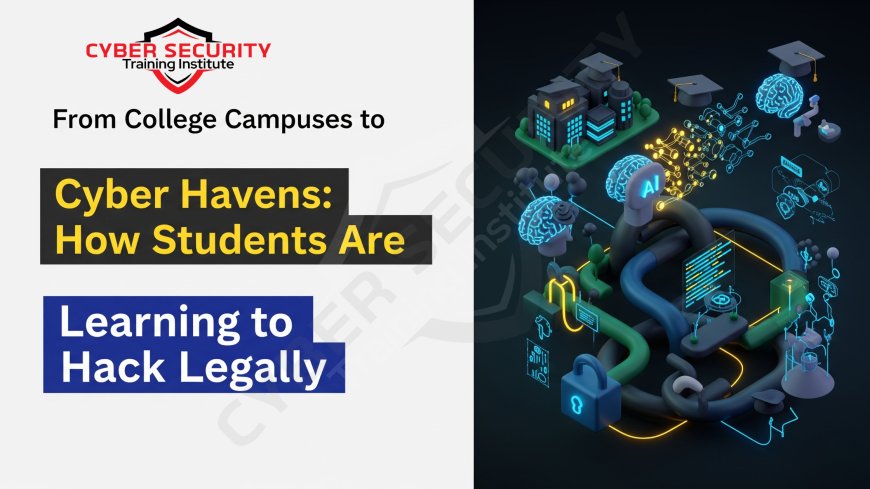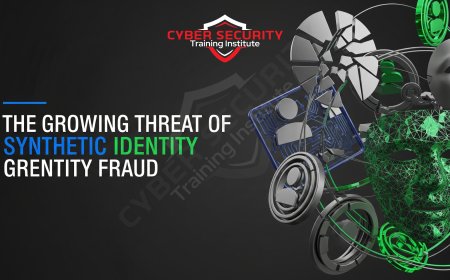From College Campuses to Cyber Havens | How Students Are Learning to Hack Legally
In a world where cyberattacks make headlines daily, the term "hacking" often carries a negative connotation. But what if hacking could be a force for good? Across college campuses and online platforms, students are diving into the world of ethical hacking—learning to break into systems not to cause harm, but to protect them. This blog post explores how students are embracing ethical hacking, the pathways available to them, and why this skill is becoming a cornerstone of modern cybersecurity. Whether you're a curious beginner or an aspiring cybersecurity professional, this guide will walk you through the exciting journey of learning to hack legally.

Table of Contents
- What Is Ethical Hacking?
- Why Students Are Learning to Hack
- Ethical Hacking in College Programs
- Online Platforms: The Cyber Havens
- Tools and Techniques Students Learn
- Career Opportunities in Ethical Hacking
- Challenges and Ethical Considerations
- Conclusion
- Frequently Asked Questions
What Is Ethical Hacking?
Ethical hacking, sometimes called "white hat" hacking, involves using hacking techniques to identify and fix security vulnerabilities in systems, networks, or applications. Unlike malicious hackers ("black hats"), ethical hackers work with permission to test and strengthen digital defenses. They’re the good guys of the hacking world, helping organizations stay one step ahead of cyber threats.
Students learning ethical hacking are trained to think like attackers but act like protectors. They learn to probe systems for weaknesses, report findings, and suggest fixes—all while adhering to strict legal and ethical guidelines. This field has grown tremendously as businesses, governments, and even non-profits recognize the need for robust cybersecurity.
Why Students Are Learning to Hack
The rise of cybercrime has created a massive demand for cybersecurity experts. Students are drawn to ethical hacking for several reasons:
- High Demand: Cybersecurity job postings have skyrocketed, with ethical hackers commanding competitive salaries.
- Intellectual Challenge: Hacking requires creative problem-solving, critical thinking, and technical skills, making it appealing to curious minds.
- Social Good: Ethical hackers protect sensitive data, from personal information to national security systems, making a real-world impact.
- Flexibility: The skills learned can lead to freelance opportunities, corporate jobs, or even entrepreneurial ventures.
For many students, ethical hacking is also exciting. It’s like solving a high-stakes puzzle with real-world consequences, blending technical expertise with a detective’s mindset.
Ethical Hacking in College Programs
Colleges and universities have recognized the need for cybersecurity education and are integrating ethical hacking into their curricula. Programs range from full-fledged cybersecurity degrees to specialized courses within computer science departments. Here’s how students are learning ethical hacking on campus:
- Dedicated Degrees: Universities like Carnegie Mellon and Purdue offer bachelor’s and master’s degrees in cybersecurity, with courses on penetration testing and ethical hacking.
- Workshops and Bootcamps: Many colleges host short-term bootcamps or workshops where students can get hands-on experience with hacking tools.
- Clubs and Competitions: Cybersecurity clubs and events like Capture the Flag (CTF) competitions allow students to practice hacking in a safe, competitive environment.
Below is a table showcasing some top universities offering ethical hacking or cybersecurity programs:
| University | Program | Focus Area |
|---|---|---|
| Carnegie Mellon University | BS in Information Security | Penetration Testing, Cryptography |
| Purdue University | MS in Cybersecurity | Ethical Hacking, Network Security |
| University of Maryland | BS in Computer Science (Cybersecurity Track) | Incident Response, Forensics |
| Rochester Institute of Technology | BS in Computing Security | Ethical Hacking, Malware Analysis |
These programs often include hands-on labs where students simulate real-world cyberattacks in controlled environments, preparing them for certifications like Certified Ethical Hacker (CEH) or Offensive Security Certified Professional (OSCP).
Online Platforms: The Cyber Havens
Not every student has access to a top-tier university program, but the internet has democratized learning. Online platforms, often called "cyber havens," provide accessible, hands-on training in ethical hacking. These platforms cater to beginners and advanced learners alike, offering flexibility and practical experience. Popular platforms include:
- Hack The Box: A platform where users can practice hacking on virtual machines, solving challenges to earn points.
- TryHackMe: Beginner-friendly, with guided tutorials and virtual labs to learn hacking step-by-step.
- OverTheWire: Offers free wargames to teach Linux and networking skills crucial for hacking.
- Coursera and Udemy: Host courses from universities and professionals on ethical hacking and cybersecurity.
These platforms often gamify learning, making it engaging. For example, TryHackMe offers "rooms" where students can practice specific skills, like exploiting web vulnerabilities or cracking passwords, in a safe and legal environment.
Tools and Techniques Students Learn
Ethical hacking requires mastering a variety of tools and techniques. Students typically start with foundational skills before moving to advanced methods. Here’s a breakdown of what they learn:
- Reconnaissance: Gathering information about a target using tools like Nmap to scan networks or Shodan to find internet-connected devices.
- Exploitation: Using tools like Metasploit to exploit vulnerabilities in systems or applications.
- Password Cracking: Learning to crack passwords with tools like John the Ripper or Hashcat.
- Web Application Testing: Identifying flaws in websites using Burp Suite or OWASP ZAP.
- Social Engineering: Understanding how to simulate phishing attacks to test human vulnerabilities.
Students also learn to use Linux-based operating systems like Kali Linux, which comes preloaded with hundreds of hacking tools. These skills are practiced in controlled environments to ensure legality and safety.
Career Opportunities in Ethical Hacking
Ethical hacking opens doors to diverse career paths. Students can pursue roles such as:
- Penetration Tester: Tests systems for vulnerabilities by simulating attacks.
- Security Analyst: Monitors and responds to security incidents in organizations.
- Bug Bounty Hunter: Finds vulnerabilities in software for rewards from companies like Google or Microsoft.
- Security Consultant: Advises organizations on improving their cybersecurity posture.
The demand for these roles is staggering. According to industry reports, the global cybersecurity market is expected to grow to $300 billion by 2027, with ethical hackers playing a critical role. Salaries for entry-level positions often start at $60,000-$80,000, with experienced professionals earning well over $100,000 annually.
Challenges and Ethical Considerations
Learning to hack legally isn’t without challenges. Students must navigate:
- Legal Boundaries: Hacking without permission is illegal, so students must ensure they only practice in authorized environments.
- Ethical Dilemmas: Deciding how to handle sensitive findings, like vulnerabilities in critical systems, requires integrity.
- Keeping Up: Cyber threats evolve rapidly, requiring continuous learning to stay relevant.
Ethical hackers must also adhere to a code of conduct, ensuring they respect privacy, confidentiality, and legal boundaries. Certifications like CEH emphasize these principles, teaching students to balance technical skills with ethical responsibility.
Conclusion
From college campuses to online platforms, students are embracing ethical hacking as a way to combat cybercrime and protect digital systems. Through degree programs, bootcamps, and cyber havens like Hack The Box, they’re gaining hands-on experience with tools and techniques that make a real difference. Ethical hacking offers not just a career, but a chance to solve complex problems and contribute to a safer digital world. Whether you’re a student considering this path or simply curious about cybersecurity, the journey to becoming an ethical hacker is both challenging and rewarding. With the right resources and mindset, anyone can learn to hack legally and make an impact.
Frequently Asked Questions
What is ethical hacking?
Ethical hacking involves using hacking techniques to find and fix security vulnerabilities with permission, helping organizations protect their systems.
Is ethical hacking legal?
Yes, as long as it’s done with explicit permission from the system owner and follows legal guidelines.
Can anyone learn ethical hacking?
Absolutely! With dedication, anyone can learn through online courses, college programs, or platforms like TryHackMe.
What skills are needed for ethical hacking?
Basic knowledge of networking, programming, and Linux, plus problem-solving and critical thinking, are key.
Do I need a degree to become an ethical hacker?
No, but a degree in cybersecurity or computer science can help. Certifications like CEH or OSCP are also valuable.
What tools do ethical hackers use?
Common tools include Nmap, Metasploit, Burp Suite, and Kali Linux, among others.
How long does it take to learn ethical hacking?
It varies, but beginners can gain basic skills in 6-12 months with consistent effort.
Are there free resources for learning ethical hacking?
Yes, platforms like OverTheWire and TryHackMe offer free or affordable training.
What is a Capture the Flag (CTF) competition?
CTF is a cybersecurity competition where participants solve hacking challenges to capture "flags" or hidden codes.
Can ethical hacking be a full-time job?
Yes, roles like penetration tester or security analyst are full-time careers with strong demand.
What is a bug bounty program?
Companies pay ethical hackers to find and report vulnerabilities in their systems, often through platforms like HackerOne.
Is ethical hacking dangerous?
Not if done legally and ethically. Unauthorized hacking, however, can lead to legal consequences.
What certifications are best for ethical hacking?
Popular certifications include Certified Ethical Hacker (CEH), Offensive Security Certified Professional (OSCP), and CompTIA Security+.
Do ethical hackers need to know coding?
Basic coding skills in languages like Python or Bash are helpful but not always required.
How do I start learning ethical hacking?
Start with free resources like TryHackMe, learn Linux basics, and practice in virtual labs.
Can ethical hackers work remotely?
Yes, many ethical hacking roles, especially bug bounties and consulting, offer remote work options.
What’s the difference between white hat and black hat hackers?
White hat hackers work legally to improve security, while black hat hackers exploit systems for personal gain.
Are there ethical hacking communities?
Yes, communities on platforms like Reddit, Discord, and Hack The Box connect learners and professionals.
How much do ethical hackers earn?
Salaries vary, but entry-level ethical hackers can earn $60,000-$80,000, with experienced professionals earning over $100,000.
Why is ethical hacking important?
It helps organizations identify and fix vulnerabilities, preventing data breaches and cyberattacks.
What's Your Reaction?
 Like
0
Like
0
 Dislike
0
Dislike
0
 Love
0
Love
0
 Funny
0
Funny
0
 Angry
0
Angry
0
 Sad
0
Sad
0
 Wow
0
Wow
0










![How to Install RHEL 10 on VMware/VirtualBox [Tutorial]](https://www.cybersecurityinstitute.in/blog/uploads/images/202509/image_430x256_68b56dc967a4a.jpg)





